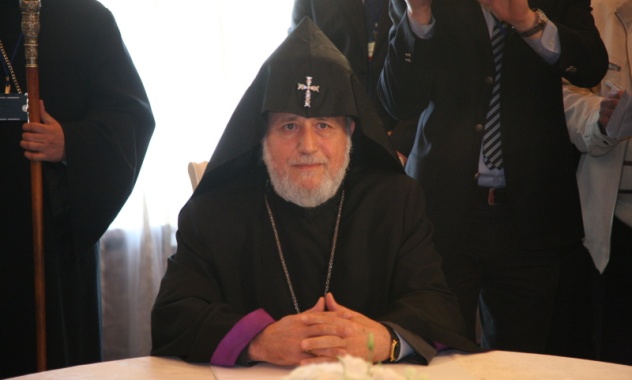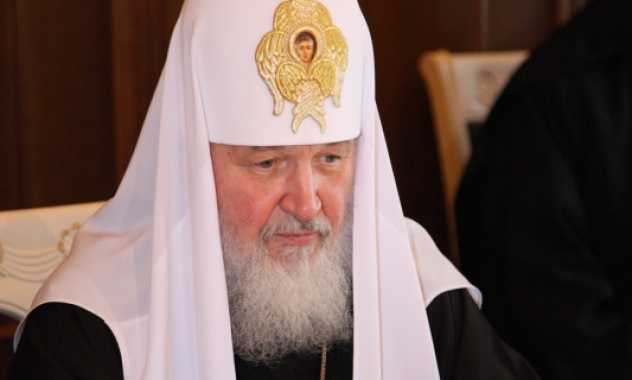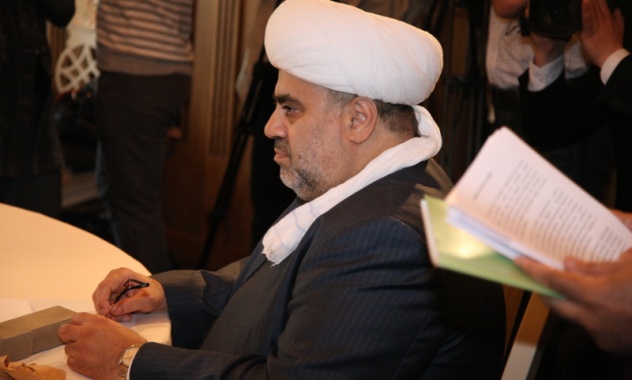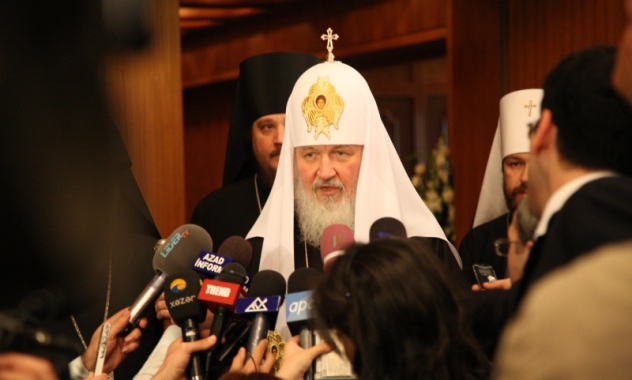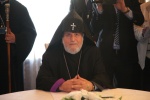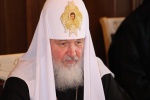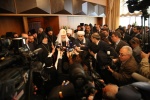Patriarch of Moscow, Chairman of Caucasus Muslim Board and Catholicos of All Armenians hold trilateral meeting
A trilateral meeting of the religious leaders of Russia and Transcaucasus – Patriarch Kirill of Moscow and All Russia, Sheikh-ul-Islam Allahshuqur Pasha-zade as chairman of the Caucasus Muslim Board, and Supreme Patriarch Catholicos Karekin II of All Armenians took place on 26 April 2010, during the World Summit of Religious Leaders in Baku.
Addressing the religious leaders of Armenia and Azerbaijan, Patriarch Kirill said, ‘The discussion on Armenian-Azerbaijani relations, especially, the Karabakh problem, has made a considerable progress in recent years. A considerable role has been played in it by political leaders, including also Presidents of Azerbaijan and Armenia, with the Russian President acting as a mediator. Therefore, despite the existing problems, there is a more optimistic prospect for the discussion on this problem, with reaching appropriate decisions. We are called to accompany the political process with prayer and common efforts, making appropriate influence on our nations and supporting our political leaders in their good intensions and good decisions. It is a first meeting with my personal participation. I believe we should exchange opinions in this circle about where we are in our religious peacemaking process and where we could direct our efforts in the nearest future’.
Sheikh-ul-Islam Allahshuqur Pasha-zade, on his part, thanked Patriarch Kirill for his attention to the settlement of the Karabakh problem, saying, ‘I would like to express great gratitude to the Russian Orthodox Church and to His Holiness personally for their mediation all through the aggravation of the Karabakh problem and for preventing this problem from acquiring a religious overtone. There were several meetings and during this one I again express confidence that this problem will be important for us and will be settled in a fair way, and not only the Karabakh problem but also all the problems concerning the Caucasus. I declare that in the future, too, I will do all that is possible to prevent this problem from acquiring a religious tint, from acquiring the significance of a religious conflict’.
The Supreme Patriarch and Catholicos Karekin II of All Armenians, addressing Patriarch Kirill and Sheikh-ul-Islam Allahshuqur Pasha-zade, said, ‘Thanks to your invitation we are now here, in Baku, at the World Summit of Religious Leaders. We are grateful for this occasion to meet and continue our dialogue and continue our efforts for a peaceful settlement of the conflict. We as servants of the word of God are called to sow peace and, according to our calling of religious leaders, we have united our efforts from the first day of the conflict in order to deter any deepening of the conflict and to establish peace for Karabakh. We highly appreciate the efforts made to prevent the conflict from growing into a religious confrontation. We are confident that it is a case where we will again call our nations to peace and a search for peaceful ways. And this call will meet with response in people’s hearts. War is evil; peace is a blessing from the Lord’.
After the meeting, the three leaders signed a joint statement.
Answering questions from journalists after the meeting, Patriarch Kirill expressed a high appreciation of the role of interreligious meetings in establishing peace and stability in the South Caucasus, saying, ‘It seems to me that it is a very right and timely initiative. The trilateral meeting is a vivid testimony to it’.
He also said that ‘religious leaders have no political power; they cannot move troops to this or that side; they cannot use the state power but they do have a special capacity for appealing to the values and ideals which are held dear by the faithful. The fact that representatives of the three religious communities met and agreed on important things is an important message to all believers. And we hope that this message will contribute to reconciliation and relaxation of the tension and, most importantly, will create preconditions and a favourable atmosphere so that the political leaders may assume all the responsibility for a political settlement of the conflict’.
DECR Communication Service
Other events
-
26.04.2010 23:37Baku Declaration on the results of the trilateral meeting between His Holiness Patriarch Kirill of Moscow and All Russia, Catholicos of All Armenians Karekin II and Sheikh-ul-Islam Allahshuqur Pasha-zade
-
26.04.2010 18:20Metropolitan Hilarion meets with the Georgian Orthodox hierarchs
-
26.04.2010 14:24(Russian) Выступление Святейшего Патриарха Московского и всея Руси Кирилла на встрече Группы религиозных лидеров высокого уровня в партнерстве с ЮНЕСКО (Баку, 26 апреля 2010 года)
-
26.04.2010 14:16Patriarch Kirill addresses the High-Level Religious Leaders Group in Partnership with UNESCO
-
26.04.2010 12:25Patriarch of Moscow, Chairman of Caucasus Muslim Board and Catholicos of All Armenians hold trilateral meeting
-
25.04.2010 21:27Patriarch Kirill attends reception given by Sheikh-ul-Islam Allahshuqur Pasha-zade
-
25.04.2010 21:12Patriarch Kirill attends a meeting of the CIS Interreligious Council
-
25.04.2010 20:55(Russian) Предстоятель Русской Православной Церкви посетил Духовное управление мусульман Кавказа
-
25.04.2010 12:59(Russian) Святейший Патриарх Кирилл возложил венок к месту захоронения Гейдара Алиева
-
25.04.2010 12:57(Russian) Предстоятель Русской Православной Церкви совершил Божественную литургию в кафедральном соборе святых жен-мироносиц в Баку
-
24.04.2010 22:17Patriarch Kirill meets with Azerbaijan President Ilham Aliyev
-
24.04.2010 19:14Patriarch Kirill begins his visit to Azerbaijan








